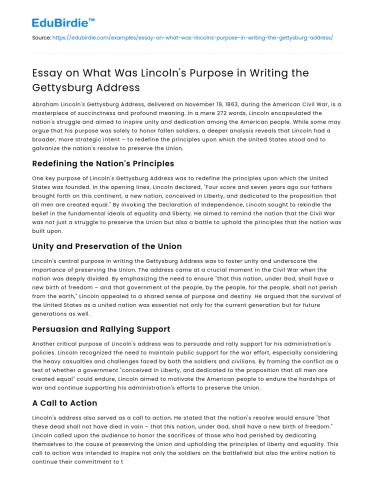Abraham Lincoln's Gettysburg Address, delivered on November 19, 1863, during the American Civil War, is a masterpiece of succinctness and profound meaning. In a mere 272 words, Lincoln encapsulated the nation's struggle and aimed to inspire unity and dedication among the American people. While some may argue that his purpose was solely to honor fallen soldiers, a deeper analysis reveals that Lincoln had a broader, more strategic intent – to redefine the principles upon which the United States stood and to galvanize the nation's resolve to preserve the Union.
Redefining the Nation's Principles
One key purpose of Lincoln's Gettysburg Address was to redefine the principles upon which the United States was founded. In the opening lines, Lincoln declared, "Four score and seven years ago our fathers brought forth on this continent, a new nation, conceived in Liberty, and dedicated to the proposition that all men are created equal." By invoking the Declaration of Independence, Lincoln sought to rekindle the belief in the fundamental ideals of equality and liberty. He aimed to remind the nation that the Civil War was not just a struggle to preserve the Union but also a battle to uphold the principles that the nation was built upon.
Save your time!
We can take care of your essay
- Proper editing and formatting
- Free revision, title page, and bibliography
- Flexible prices and money-back guarantee
Unity and Preservation of the Union
Lincoln's central purpose in writing the Gettysburg Address was to foster unity and underscore the importance of preserving the Union. The address came at a crucial moment in the Civil War when the nation was deeply divided. By emphasizing the need to ensure "that this nation, under God, shall have a new birth of freedom – and that government of the people, by the people, for the people, shall not perish from the earth," Lincoln appealed to a shared sense of purpose and destiny. He argued that the survival of the United States as a united nation was essential not only for the current generation but for future generations as well.
Persuasion and Rallying Support
Another critical purpose of Lincoln's address was to persuade and rally support for his administration's policies. Lincoln recognized the need to maintain public support for the war effort, especially considering the heavy casualties and challenges faced by both the soldiers and civilians. By framing the conflict as a test of whether a government "conceived in Liberty, and dedicated to the proposition that all men are created equal" could endure, Lincoln aimed to motivate the American people to endure the hardships of war and continue supporting his administration's efforts to preserve the Union.
A Call to Action
Lincoln's address also served as a call to action. He stated that the nation's resolve would ensure "that these dead shall not have died in vain – that this nation, under God, shall have a new birth of freedom." Lincoln called upon the audience to honor the sacrifices of those who had perished by dedicating themselves to the cause of preserving the Union and upholding the principles of liberty and equality. This call to action was intended to inspire not only the soldiers on the battlefield but also the entire nation to continue their commitment to the cause.
Conclusion: A Transformative Message
In conclusion, while it is true that Lincoln's Gettysburg Address aimed to honor fallen soldiers, its purpose was far more profound and strategic. Lincoln sought to redefine the principles of the nation, foster unity, persuade and rally support, and issue a call to action. The address's enduring impact lies in its ability to resonate with generations to come, reminding them of the ideals that the United States stands for and the sacrifices made to preserve those ideals. As a result, Lincoln's Gettysburg Address remains one of the most iconic and persuasive speeches in American history, encapsulating the spirit and resolve of a nation in turmoil.






 Stuck on your essay?
Stuck on your essay?

